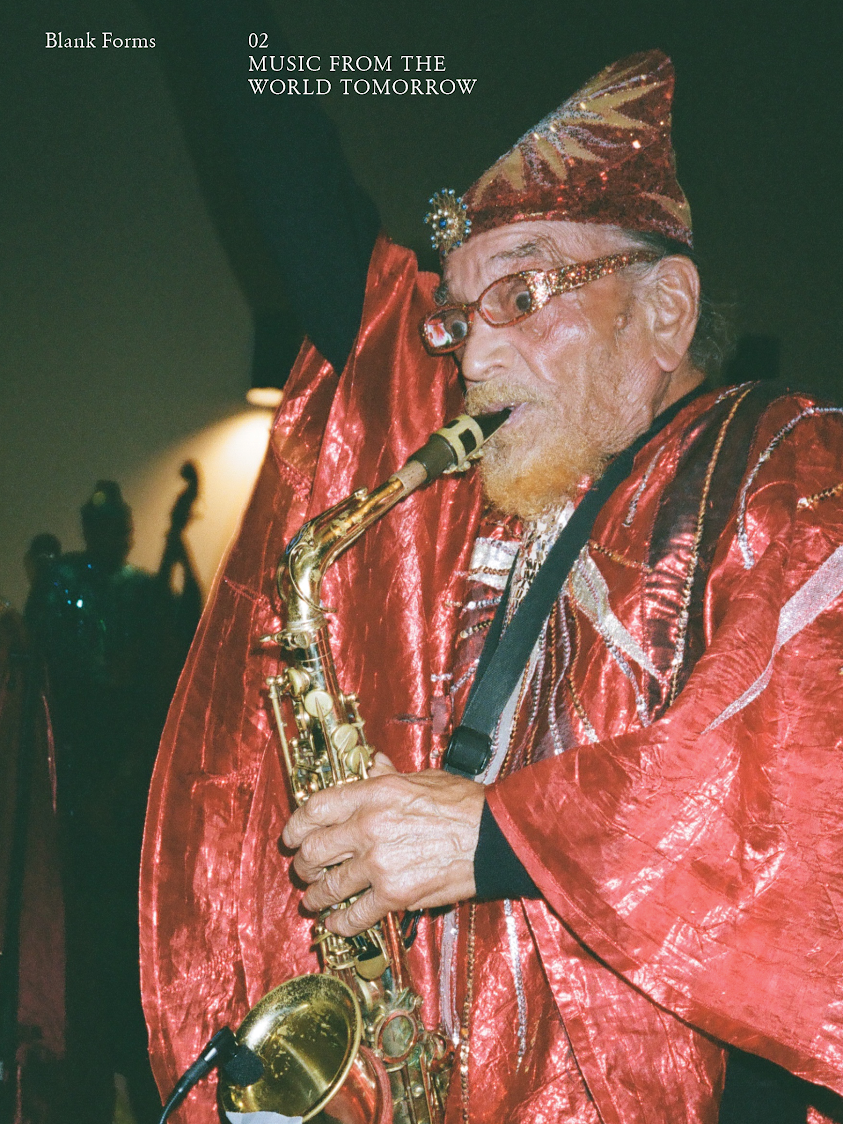Blank Forms 02: Music From The World Tomorrow

Sold out
Edited by Lawrence Kumpf and Joe Bucciero with contributions by Alan Licht, Klaus Lang, Tashi Wada, Larry J. Nai, David Hopkins, Dafne Vicente-Sandoval, Akio Suzuki, Marcus Boon, Limpe Fuchs, Amy Cimini, Annea Lockwood, Crys Cole, John Corbett, Joan Brigham, Olaf Stapledon, Andrew Lampert, and Matana Roberts.
This second issue of Blank Forms’ journal brings together a combination of never-before published, lost, and newly translated materials that supplement the non-profit’s live programs. It is envisioned as a platform for critical reflection and extended dialogue between scholars, artists, and other figures working within the world of experimental music and art.
Complementing Marshall Allen and the Sun Ra Arkestra’s appearance on the cover, this issue features John Corbett’s writing on the enigmatic annotations found on Sun Ra’s reel-to-reel tape archives, accompanied by full-color photos of the near-hieroglyphic tapes themselves. Visionary avant-garde jazz vocalist Patty Waters speaks with Larry J. Nai about what moved her from childhood to the then-now, touching upon her mysterious ‘70s and ‘80s period of musical inactivity in a rare 1997 Halana interview reprinted here. “I struggle”, a prose poem by alto saxophonist and sound experimentalist Matana Roberts, explores the creative conundrum of making American music in a state of national crisis under POTUS #45.
Maryanne Amacher remains a focal point of this second issue, with three pieces related to Blank Forms’ work with the pioneering sound artist’s archive: scholar Amy Cimini contributes a text detailing the genesis, score, and theoretical underpinnings of Amacher’s Adjacencies; Joan Brigham presents Scott Fisher’s account of his career working with virtual reality and 3D stereoscopic imaging (photo examples included) and its intersections with Amacher, most notably at MIT’s legendary Center for Advanced Visual Studies; and an excerpt from science fiction writer Olaf Stapledon’s Last and First Men—a favorite of Amacher’s—is reproduced, telling of a speculative race of sadistic humans with highly developed ears who, forty million years in the future, grapple with an all-too-familiar narrative of music’s divine nature reduced to profanity by power.
The late polymath avant-garde artist Tony Conrad is represented twice.Filmmaker Andy Lampert introduces a selection of Conrad’s OLD IDEAS—handwritten notes from the mid-1960s through the mid-1970s that illustrate the operation of Conrad’s brainiac intellect at play, many written as near Fluxus word scores—presented here in full color. A new transcription of a 1989 phone interview by Alan Licht details Conrad’s Early Minimalism project, a postmodern streak in his compositions, the Theater of Eternal Music’s involvement with the overtone series, and his disparaging outlook on La Monte Young’s “Indian swami racket”. Conversely, in her rediscovered 2001 interview with Marcus Boon, Swedish minimalist Catherine Christer Hennix praises La Monte’s revival of just intonation, recounting her discipleship with Hindustani classical vocalist Pandit Pran Nath and the limitless universe of his tuned tamburas.
This issue features a transcription of a 2017 Annea Lockwood talk and conversation with send + receive festival director Crys Cole, discussing Lockwood’s Tiger Balm (1970) and Ear-Walking Man/Woman (1996). Bassoonist Dafne Vicente-Sandoval contributes a text that sheds light on the complex processes at work behind the performance of Jakob Ullmann’s threshold compositions Muntzer’s stern and Solo II, slated for a forthcoming CD on Editions RZ. And Klaus Lang, another artist on the label, provides both an aphorism about cow behavior and a manifesto for compositional strategies that respond to freedom, time, and politics under late capitalism.
Krautrock group Anima’s 1981 US tour diary has been newly translated from the German by Larissa Mellor for inclusion here. Written in an ebullient, precocious prose by Paul and Limpe Fuchs’ 13-year-old son Zoro Babel, the text chronicles the Fuchs family’s leisurely exploration of America by freighter ship and car, featuring encounters with Karl Berger and plenty of organic farm food, accompanied by David Fuchs’ photo documentation. A chapter from David Hopkins’ recent translation of legendary Japanese folk singer and PSF recording artist Kan Mikami’s autobiography is a lyrical account of the cultural and musical violence of being 19 in 1969 Kodomari, Aomori.
Composer Tashi Wada contributes ‘visual levitation’ in the form of a print titled “Double Vision”. And Japanese sound art pioneer Akio Suzuki’s self-published 2008 Aki-nyan, tora no maki, a comic zine depicting cats playing his many instrumental inventions, finally gets its deserved circulation via a full reprint.
Music from the World Tomorrow release party
Music from the World Tomorrow release party